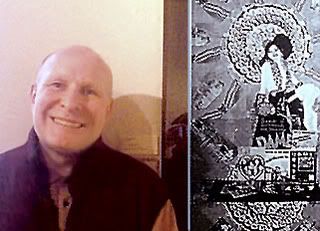Wildlife: An immature Bald Eagle joined our mature pair on Middle Foy's lake yesterday. -- not their baby, just a migrating adolescent.
Weather: Blue skies, sunshine, plee-ease just GO ... Oh how I wish that it would SNOW!
Sorry, I just had a "Temptation" to misquote those lines.
Charity Alert: The Literacy Site ... and more! Maybe the ability to read isn't enough, nowadays, but it's a better situation than illiteracy. (See emotional manipulation issues below.)
When I was at the Red Cross giving blood yesterday, one of the staff was bemoaning "too many donations" to Tsunami Relief. Send your money to Oxfam and others who want to stick around and help the people who have to rebuild their lives in Sri Lanka, Sumatra, etc.
Media Watch: I watched a TV movie called Not In This Town, based on an outbreak of hate crimes in Billings, Montana which were especially directed at Jewish people. The movie was typically manipilative, and necessarily fictional in it's conversational details, but that's TV -- very minimal content, and lots of broad-brush emotions.
My friends at The Working Group made a rather more sober PBS documentary about those events, and the community's response, called Not In Our Town.
Here's their Website: Working Group tapes
Not In Our Town ... tells the uplifting story of how the residents of Billings, Montana, joined together when their neighbors were threatened by white supremacists. Townspeople of all races and religions swiftly moved into action. Religious and community leaders, labor union volunteers, law enforcement, the local newspapers and concerned individuals stood united and spoke loudly for a hate-free community, proclaiming in no uncertain terms "Not In Our Town!" This critically acclaimed PBS special sparked a national campaign against hate crimes that continues to grow each year.
Not In Our Town II ... briefly recaps the Billings story and tells six compelling new stories about people working to create hate-free towns, cities, workplaces and schools. A Klan rally is countered with a diversity celebration; citizens work with police to address hate crimes; young people discuss how hate crimes affect their lives; office workers discover that improved communication skills can ease racial tensions and create a more harmonious workplace; people come together to rebuild burnt churches in the South; and a town finds that preventing hate before it starts is the best solution.
Not In Our Town Study Guide (.pdf)
I just finished a book about newspaper comic strips, published about 1995, when there was some hype about "100 years of comic strips." The medium actually predates Hearst's Yellow Kid by generations. Robert Beerbohm, Michael Feldman, and others are doing the long-overdue scholarship.
That being said, there were some interesting stories, insights, and illustrations in the oversized paperback, but damn, it was hard to read -- some of the most fractured editing I've ever seen. The title isn't really important.
Then is then, now is now, but it's good to remember mistakes, and know what propaganda looks like -- Here's an item that's sweeping the Blogoshere:
Daily Kos: U.S. Encouraged by Vietnam Vote: Officials Cite 83% Turnout Despite Vietcong Terror
by Peter Grose, Special to the New York Times (9/4/1967: p. 2)
WASHINGTON, Sept. 3-- United States officials were surprised and heartened today at the size of turnout in South Vietnam's presidential election despite a Vietcong terrorist campaign to disrupt the voting.
According to reports from Saigon, 83 per cent of the 5.85 million registered voters cast their ballots yesterday. Many of them risked reprisals threatened by the Vietcong.
The size of the popular vote and the inability of the Vietcong to destroy the election machinery were the two salient facts in a preliminary assessment of the nation election based on the incomplete returns reaching here.
Pending more detailed reports, neither the State Department nor the White House would comment on the balloting or the victory of the military candidates, Lieut. Gen. Nguyen Van Thieu, who was running for president, and Premier Nguyen Cao Ky, the candidate for vice president.
A successful election has long been seen as the keystone in President Johnson's policy of encouraging the growth of constitutional processes in South Vietnam. The election was the culmination of a constitutional development that began in January, 1966, to which President Johnson gave his personal commitment when he met Premier Ky and General Thieu...
Tuesday, February 01, 2005
Subscribe to:
Post Comments (Atom)

No comments:
Post a Comment